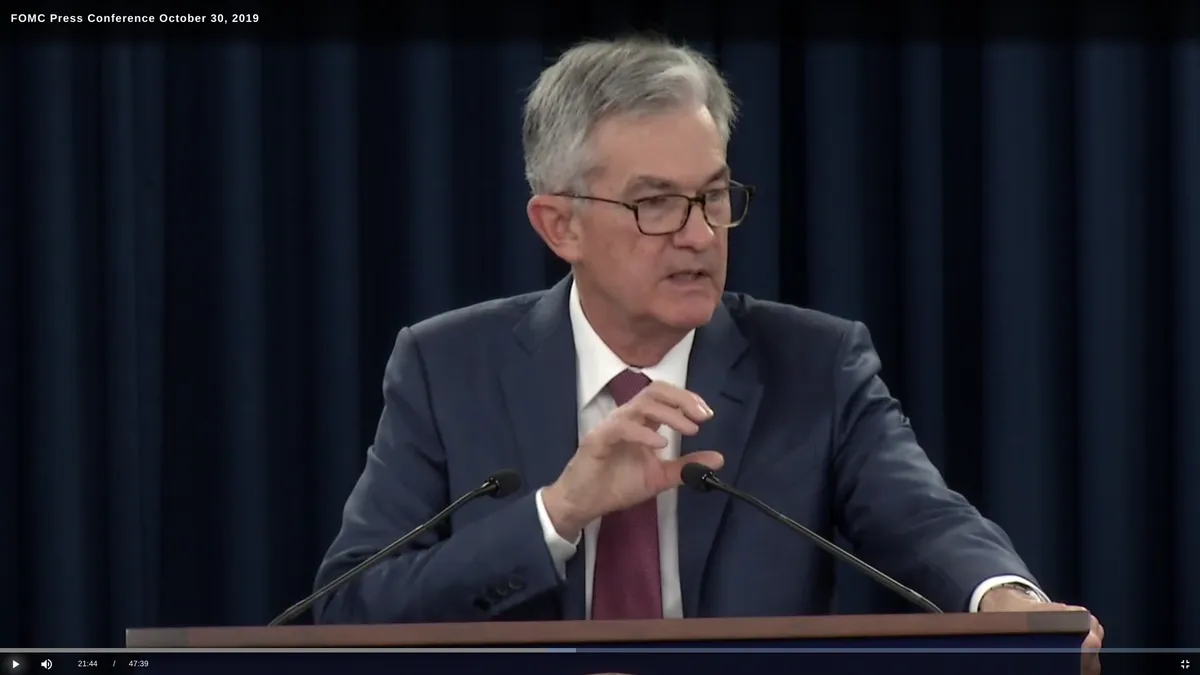Dive Brief:
- Federal Reserve Chairman Jerome Powell would rather "get it right" than "be first" in researching and potentially developing a central bank digital currency (CBDC), he told a panel hosted Monday by the International Monetary Fund (IMF).
- The Fed's primary interest lies in improving the payments landscape rather than in replacing the dollar, Powell said.
- Powell's philosophy of getting it right would balance benefits such as speedier and cheaper cross-border transactions against risks such as cyberattacks, counterfeiting and fraud.
Dive Insight:
The Federal Reserve Bank of Boston announced in August it is partnering with researchers at the Massachusetts Institute of Technology to build and test a hypothetical CBDC. Despite that, Powell said Monday the Fed hasn't "made a decision to issue one," adding that more work needs to be done, along with "extensive" public consultation with stakeholders.
Fed officials have acknowledged that other governments' advancements in developing digital currencies — particularly China's — as well as Facebook's move to craft the Libra stablecoin have served as motivators behind the central bank's effort to enter the digital currency sphere.
Powell said about 80% of central banks worldwide are exploring digital currencies. China launched a pilot program in April testing a CBDC in four cities, The Wall Street Journal reported. Sweden, meanwhile, began an e-krona project in 2017. The Bank of Canada has launched a formal research project. And the Bank of Japan said this month it aims to start experimenting with digital currency next year, according to Bloomberg.
Given the dollar's global importance, the U.S. has an obligation to "stay on the forefront" of digital currency innovation, Powell said. But while some countries are looking to phase out paper money, that's not the U.S.'s intention, he said.
"Unlike some jurisdictions, here in the United States we continue to see strong demand for cash," Powell said, according to American Banker. "Moreover, we have robust and mature financial and banking sectors, and we have a highly banked population so that many — although not all — already have access to the electronic payments system."
However, IMF leaders at Monday's event cited the need to revamp a cross-border transaction system that charges overseas workers an average of 7% of the transferred amount to send money to their families in low- and middle-income countries. That's more than twice the United Nations' sustainable development goal, IMF Managing Director Kristalina Georgieva said.
The coronavirus pandemic could add to the squeeze, as remittances — which the World Bank estimated at $500 billion last year — are projected to decline 20%, The Wall Street Journal reported.
The U.S. needs to consider how a potential digital dollar would be protected from cyberattacks, how it would affect monetary policy and financial stability and how it would maintain user privacy, Powell said, adding that Facebook's ongoing development of Libra "generally succeeded in focusing attention" on some of those issues.
Moreover, he said, it's important to engage technology companies in discussing digital currencies. "It's probably too early to say how much Libra will ultimately shape the payments system," Powell said, according to American Banker. "I do think it has caused regulators to think carefully about the appropriate risk management and compliance expectations for emerging innovations."
A survey of more than 13,000 people published in February on behalf of the Official Monetary and Financial Institutions Forum (OMFIF) found central banks to be the most trusted issuers of digital currency. About 51% of respondents said they'd trust a digital currency issued by a central bank, compared with a 48% trust rating for payment service providers such as PayPal, 47% for commercial banks, 40% for credit card companies and 37% for internet technology companies.














